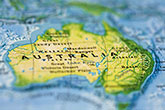The coal industry and the Indian and Indonesian elections
Published by Jonathan Rowland,
Editor
World Coal,
Aleksandra Tomczak, World Coal Association, discusses the possible impact of elections in India and Indonesia on the global coal industry.
With around 40 national elections, representing 42% of the world’s population and more than half of its GDP, 2014 could be one of the most significant policy years on record. Bearing the highest potential for change is this year’s general election in India, which many experts believe could finally unlock the country’s economic potential and further increase coal-based energy demand. But the coal industry will also be watching the Indonesian presidential election with interest.
The year that could unlock India’s economic potential
The policy agenda in India will be dominated by general elections that take place before the end of May. According to regional experts, regardless of the outcome of the elections, public opinion will place tremendous pressure on the new government to deliver economic growth and create jobs. With the Bharatiya Janata Party (BJP) ousting the Indian National Congress Party, we are most likely to see a more pro-business environment in India. The BJP’s prime ministerial candidate, Narendra Modi, earned himself a name for engineering an economic miracle in Gujarat, where he served as the chief minister.
International Energy Agency analysis shows that higher economic growth in India will go in tandem with higher energy demand and higher coal imports. India is also set to pass China as the world’s largest importer of coal soon after 2020. With power generation based on coal and a population of over one billion people, including over 300 million with no access to electricity, higher economic growth in India would have a huge impact on the international coal industry.
Experts say that India needs a comprehensive plan to unlock its economic potential because the current infrastructure is simply insufficient to address India’s developmental needs. This will mean better railway and port capacity and necessary reforms to the energy sector. For the coal mining industry in India, change would have to bring private-sector investment and make environmental planning more effective to speed up investments, while also respecting the rights of local communities.
Indonesia considers higher royalties and production restrictions
The policy and regulatory environment for coal mining operations and coal use in Indonesia will be strongly influenced by this year’s parliamentary elections in April and the presidential elections that will follow in July, with a possible runoff in September. A new president will be appointed in October, the current president having reached his term limit, and a new cabinet will be formed in the latter part of the year. It is expected this will include a new minister of mines and energy.
According to regional experts, the electoral campaigns will be influenced by brewing nationalism and pressures from civil society to make better use of Indonesia’s natural resources for the benefit of Indonesians. These aspects are likely to affect the environment in which coal companies operate.
Restrictions on coal production and coal exports, as well as increased royalty rates, have already been discussed at the national government level and could emerge as key points in the electoral campaign. In fact, regardless of the outcome of the elections, coal miners in Indonesia already expect some sort of restrictions to be introduced in 2014 –most probably production based. On the table is also an increase in the royalties paid to provincial and federal governments by companies that produce from coal mining leases (IUPs). Current royalties for IUP producers range from 5% to 10%, depending on coal quality, and rates possibly could increase to as much as 10 – 13.5%.
Domestic electrification efforts and the desire to extend the lifetime of Indonesia’s coal resources are among the key motives behind the idea to restrict coal production or exports. As more coal-fired power plants are being built to address energy poverty, still affecting 66 million people living in Indonesia, the proportion of coal destined for the export market could drop from the current 80%. Currently the government is working through its Customs Department to better register and control exports, particularly those of the small-scale miners that often ship from local ports. It is expected that this programme will result in further monitoring of – and a possible restriction on – coal exports.
This is an edited extract of an article that first appeared as TOMCZAK, A., “What to watch in 2014: Policy developments that will shape the coal industry”, Cornerstone (Spring 2014), pp. 19 – 25. Cornerstone is the official journal of the World Coal Association.
Written by Aleksandra Tomczak. Edited by Jonathan Rowland
Read the article online at: https://www.worldcoal.com/special-reports/21052014/the_coal_industry_and_the_indian_and_indonesian_elections_coal870/
You might also like
Electrification in Mining virtual conference
Join us on 16 April 2024 for Global Mining Review's first Electrification in Mining event is an interactive virtual conference, focusing on electrification as the future of sustainable mining and exploring the innovative approaches and technologies being developed to facilitate its implementation.
Whitehaven Coal completes acquisition of Blackwater and Daunia mines
Whitehaven Coal has completed the acquisition of the Blackwater and Daunia coal mines in Queensland, Australia.



